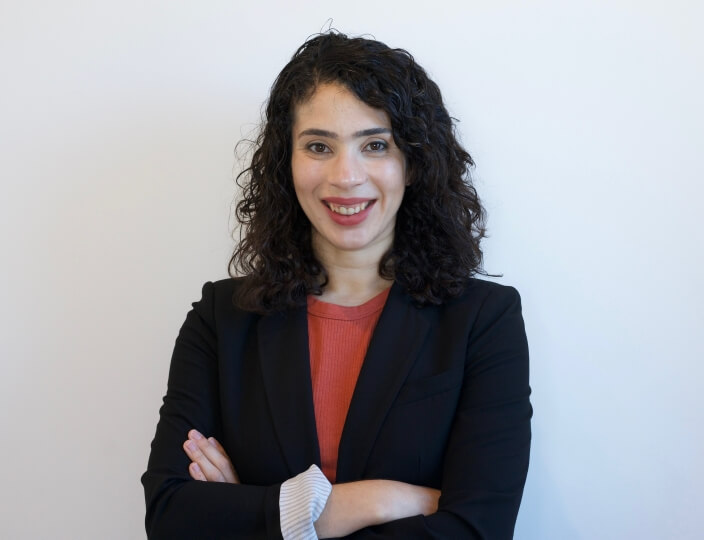Diana De los Santos Mosha (Credit: Diana De los Santos Mosha)
Diana De los Santos Mosha didn’t want to put her engineering training to conventional use.
Attending the Harvard John A. Paulson School of Engineering and Applied Sciences (SEAS) was an unconventional choice for Mosha, A.B. ‘09, a first-generation American and the first member of her family to attend college.
As she pursued her degree in engineering sciences, Mosha sought out ways to use her concentration’s approach to problem solving as a way to create educational change.
“What I saw was that I could apply some of the thinking that I really loved from engineering, such as systems, experiments, testing out things that work and being data-driven, and apply that to social issues and problems that I felt and saw illuminated through my time in college,” she said. “Where I might fit in best is maybe not building robots, but working to bring the exceptional opportunity that I had to attend Harvard to more kids.”
Mosha has spent the last 12 years doing that in school districts all over the country. She’s worked in New York, North Carolina, Boston and now Los Angeles, where the 34-year-old Connecticut native works as Director of Curriculum Systems Advising for the Partnership for Los Angeles Schools.
“My work is to specifically partner at the district level to try to help them engineer the systems that they have in place to broadly impact student achievement,” Mosha said. “We’re really focused on trying to help them make their math classes a place where kids aren’t just memorizing stuff anymore, but start to see math as a way to analyze and critique (the world) around them, and really identify as mathematicians.”
Mosha’s passion for science, technology, engineering and math (STEM) education were nurtured while growing up in Bridgeport, Conn. Her school offered Advanced Placement courses in the STEM subjects she loved, although she said that preparation was insufficient.
“What I learned pretty quickly once I was at Harvard was that those classes weren’t to a level of rigor and expectation of what’s really necessary to excel in technical fields post-bachelor’s degree,” Mosha said. “That did motivate me to want to go back to similar communities to increase the access kids have to rigorous math and science programming.”
That motivation led Mosha to join Teach for America, where she taught middle school mathematics in the Achievement First Charter Schools system in New York City. She pursued a master’s degree in teaching through the Relay Graduate School of Education at the same time.
That first teaching experience showed Mosha how to apply the problem-solving strategies she learned at SEAS to an educational setting.
“Data-driven instruction was really their bread and butter, so I really felt at home,” Mosha said. “We had clear objectives we were trying to reach with our kids, a clear way to measure whether or not we were getting them there, and time and space to reflect on whether that was happening. I just thought of it as an engineering process: let me backwards-design from where I’m trying to go, test out if this works, and keep adjusting along the way.”
That approach has guided Mosha throughout her career. Sometimes it meant working as an instructional leader or leadership coach, helping improve STEM curricula at schools in North Carolina and Boston.
Sometimes it meant working as Director of Education for Girls Who Code, a nonprofit founded in 2012 to increase girls’ access to computer science training and education, and in turn decrease the gender gap in engineering. While there, Mosha built relationships with large tech companies like Twitter, Google, and Apple to create a mentorship network for girls considering STEM careers, something she said can be hard to find in many of the communities where she’s worked.
“Most adults who are in classrooms today haven’t had the kind of math and science exposure that the kids who are in classrooms today will need in order to be successful in STEM fields,” she said. “Having a program that’s been designed in collaboration with education experts and STEM experts helps bridge that knowledge gap.”
After two years with Girls Who Code, Mosha began to miss K-12 education. In 2018, she joined the Achievement Network, a nonprofit that takes a data-driven approach to improving schools and curricula nationwide, and this year moved to Los Angeles and joined the Partnership for Los Angeles Schools.
Mosha has definitely found an unconventional outlet for her engineering background, but credited Harvard for inspiring her to do so. The school exposed her to people with numerous backgrounds and identities, and she tried to pursue a course load that took advantage not only of SEAS, but the breadth of educational opportunities at Harvard.
Put all that together, and you have someone using engineering to create social change.
“There were more technical schools that I was accepted into where I could’ve gone super deep in engineering,” she said. “But I think the variety of people I was able to meet, and the courses that were available outside the engineering pathway, really expanded the way that I saw the world, and the way that I believed that I could have the most positive impact.”
Press Contact
Matt Goisman | mgoisman@g.harvard.edu
